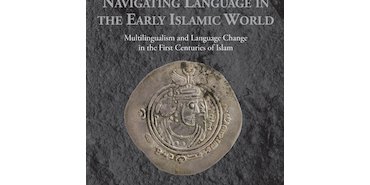Borrut (Antoine), Ceballos (Manuela), Vacca (Alison) des., Navigating Language in the Early Islamic World : Multilingualism and Language Change in the First Centuries of Islam, Leuven, Brepols N.V., 2024, 475 p. ISBN 978-2503603018
Editors
Antoine Borrut is Associate Professor in the Department of History at the University of Maryland. His publications include Entre mémoire et pouvoir : l’espace syrien sous les derniers Omeyyades et les premiers Abbassides (v. 72-193/692-809) (Brill, 2011 ; English translation forthcoming) and several co-edited volumes such as Umayyad Legacies : Medieval Memories from Syria to Spain (Brill, 2010) and Christians and Others in the Umayyad State (The Oriental Institute, 2016).
Manuela Ceballos is Assistant Professor in the Department of Religious Studies at the University of Tennessee, Knoxville. She is currently working on a manuscript tentatively titled : Between Dung and Blood : Sainthood and Power in the early modern Western Mediterranean.
Alison Vacca is Gevork M. Avedissian Associate Professor of Armenian History at Columbia University. Her first book Non-Muslim Provinces under early Islam : Islamic Rule and Iranian Legitimacy in Armenia and Caucasian Albania, was published by Cambridge University Press in 2017 and received the 2018 prize from the Central Eurasian Studies Society.
Presentation
Traditional accounts of Arabicization have often favoured linear narratives of language change instead of delving into the diversity of peoples, processes, and languages that informed the fate of Arabic in the early Islamic world. Using a wide range of case studies from the caliphal centres at Damascus and Baghdad to the provinces of Arabia, Egypt, Armenia, and Central Asia, Navigating Language reconsiders these prevailing narratives by analysing language change in different regions of the early Islamic world through the lens of multilingualism and language change. This volume complicates the story of Arabic by building on the work of scholars in Late Antiquity who have abundantly demonstrated the benefits of embracing multilingualism as a heuristic framework. The three main themes include imperial strategies of language use, the participation of local elites in the process of language change, and the encounters between languages on the page, in the markets, and at work. This volume brings together historians and art historians working on the interplay of Arabic and other languages during the early Islamic period to provide a critical resource and reference tool for students and scholars of the cultural and social history of language in the Near East and beyond.
content
Introduction
Antoine Borrut, Manuela Ceballos, and Alison M. Vacca, ‘Multilingualism in the Early Islamic World’
Section One : Languages of the Umayyad Caliphate
Petra M. Sijpesteijn, ‘The Early Islamic Empire’s Policy of Multilingual Governance’
Marie Legendre, ‘The Translation of the Dīwān and the Making of the Marwanid "Language Reform" : Secretarial Agency, Economic Incentives, and Regional Dynamics in the Umayyad State’
Antoine Borrut, ‘Towards an Arabic Cosmopolis : Culture and Power in Early Islam’
Section Two : Multilingualism, Empires, and Local Elites
Muriel Debié, ‘The Arabs and Northern Languages and Scripts before Islam’
Robert Haug, ‘Triliteral Coins and Political Authority along a Contentious Frontier : Between Arabic, Bactrian, and Pahlavi in Late Antique Khurāsān’
Alison M. Vacca, ‘Arabic and the Public Performance of Power in Early Medieval Armenia’
Judith A. Lerner, ‘From Bactrian to Arabic : Changes in Seals and Sealing Practices as Observed in the Documents from Bactria’
Section Three : Languages in Contact and Shared Spaces
Khodadad Rezakhani, ‘Navigating Persian : Travels and Tribulations of Middle Iranian Languages’
Aaron Butts, ‘Once Again, the Twin Histories of Arabic and Aramaic (with a Focus on Syriac)’
Arianna D’Ottone Rambach, ‘Sharing the Written Space : Contact and Interaction between Arabic and Other Scripts as Attested by Palaeographical and Codicological Evidence’
Fred Astren, ‘ʿAbbāsid Book Culture and Ninth-Century Jewish Sectarianism’
***
Index

